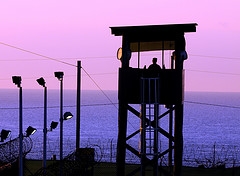Complicity of medical personnel in torture at Guantánamo Bay: how the media responded
As you may be aware, just over a month ago PLoS Medicine published research by Vincent Iacopino and Stephen Xenakis that reviewed the case records and legal documents of nine detainees at Guantánamo Bay (GTMO) and suggested that medical personnel assigned to the Department of Defense neglected to act on medical evidence of torture. Not surprisingly this paper, together with our editorial, received lots of attention in the wider media and a huge number of views (over 10,000 and counting). Now that the initial storm of coverage has quietened, we thought we’d review some of the most interesting articles.

A headline-worthy revelation in its own right, the media spotlight on this paper was intensified by the Wikileaks release of over 700 case files from Guantánamo Bay, two days before the paper’s publication. With headlines such as “Guantanamo Bay doctors ‘complicit’ in torture” from The Telegraph (UK) and “Doctors ‘turned blind eye’ at Guantanamo” from The Telegraph (Australia), news reports mainly focused on the paper’s principal findings. Courtney Hutchinson at ABC News highlights the fact that doctors recorded injuries but failed to describe how they happened, quoting author Vincent Iacopino: “Apparently the clinician did not ask how the injury occurred”. Similarly, Stephanie Pappas at LiveScience refers to medics’ seeming preference for “diagnoses that would not suggest intentional harm”. Peter Aldhous at the New Scientist, as well as discussing the study’s findings, mentions key limitations, such as the difficulty of assessing the accuracy of diagnoses through later analysis of medical records.
Other journalists centred their reports on the ethical issues raised by the findings. Winston Chung at the San Francisco Chronicle questions whether “health care personnel are bound to the ethics of their profession or federal duty”. Dan Vergano at USA Today quotes the PLoS Medicine Editorial, published alongside the Iacopino paper: “These findings are, of course, at stark odds with the codes of international medical associations, which prohibit physicians from participating in or being present during torture or other degrading procedures”.
In a Danger Room blog post for Wired, which picked up over one hundred reader comments, Spencer Ackerman provides a brief statement from a Pentagon spokeswoman, followed by an official response (also published on USA Today) issued later by the US Department of Defense. The response states that GTMO detainees “receive timely, compassionate, quality healthcare”, but does not directly refer to the study’s findings. Peter Green at Bloomberg cites the authors’ conclusion, which emphasises the need for an impartial enquiry into US medical complicity with torture at Guantánamo, while on OpEdNews, Stephen Soldz, a psychological consultant on two of the Guantánamo trials, calls for an investigation into detainees’ medical files: “We should demand that Guantanamo medical records be opened, with prisoner consent, to independent inspection”.
The media response to the paper has been, on the whole, one of keen interest and quiet outrage. One of the stronger reactions to the study’s findings came from blogger Andrew Sullivan at The Daily Beast: “Those who did this, cooperated with it and authorized it should be prosecuted and jailed. Either there is a rule of law or there isn’t. Either we are a civilized country or we are not.”
